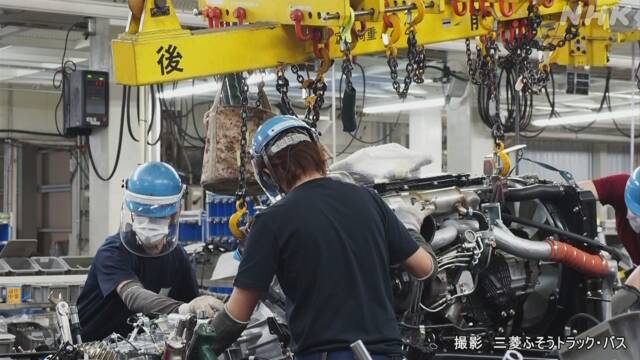Measures to prevent infection in the manufacturing industry are difficult to work from home New Corona May 14 16:42
Even at the production sites of manufacturing industries where it is difficult to work from home, efforts are being made to prevent infection by establishing unique guidelines.
This month, truck manufacturer Mitsubishi Fuso Truck and Bus established guidelines for infection prevention for employees involved in production.
At the factory in Nakahara Ward, Kawasaki City, employees are encouraged to keep a distance of 1.5 meters in principle. When employees need to work closer together, such as in the production process where heavy parts are used, we have started experimentally installing a face shield that covers not only the mask but the entire face. We also change gloves every half day throughout the factory and thoroughly disinfect the locker room to prevent infection.
At this factory, we temporarily stopped production of trucks because it became difficult to procure parts due to the spread of the new coronavirus, but we are continuing to operate while adjusting production.
Takashi Baba, Production Manager of the Mitsubishi Fuso Truck and Bus Manufacturing Division, said, “Many trucks cannot be automated, so manual work is difficult, and infection prevention is very important. First, we created guidelines, but measures against new coronavirus are long-term. With a view to the future, we would like to share our wisdom with each other and improve the working environment to make it safer and easier to work in. "
Measures spread by each manufacturer
In addition, Toshiba plans to reduce the number of employees who go to work by introducing a three-day workweek system next week at domestic plants.
Also, Toyota Motor Corporation will delay the start time of work from the evening by 30 minutes at 10 factories in Aichi Prefecture from the end of March, secure approximately 1 and a half hours for employees to change, and contact employees. I am decreasing.
IHI, a major machine maker, is a factory that makes aircraft engines in Mizuho-cho, Tokyo, and divides the employees into two groups, with a system in which they work while changing each week.
Isuzu Motors has tripled the number of commuter buses that operate to the Fujisawa factory in Kanagawa prefecture during the morning work hours to prevent congestion.
The problem is that it is difficult for employees working at the production site to work from home, and each company is devising ways to maintain production and prevent infection.

